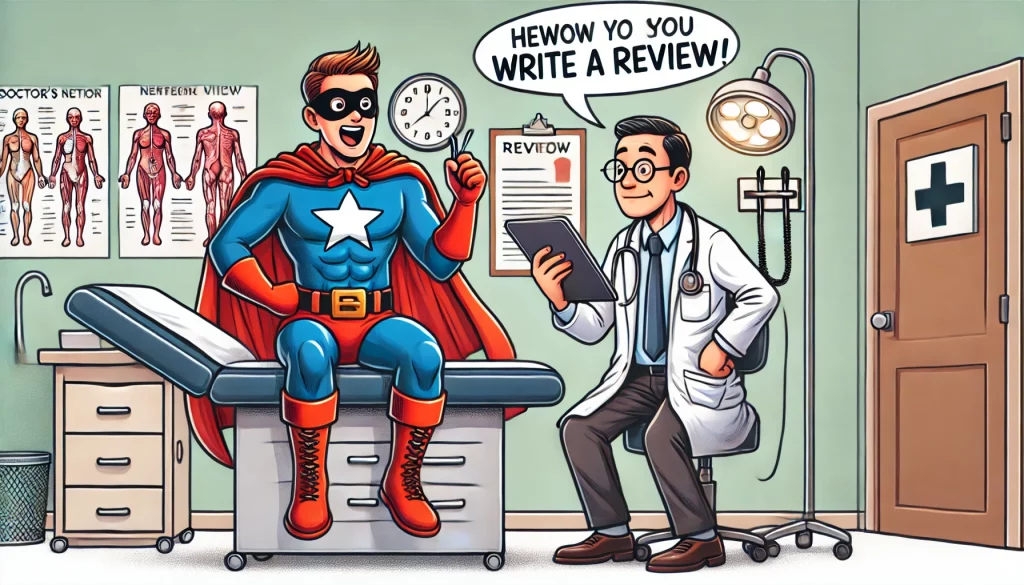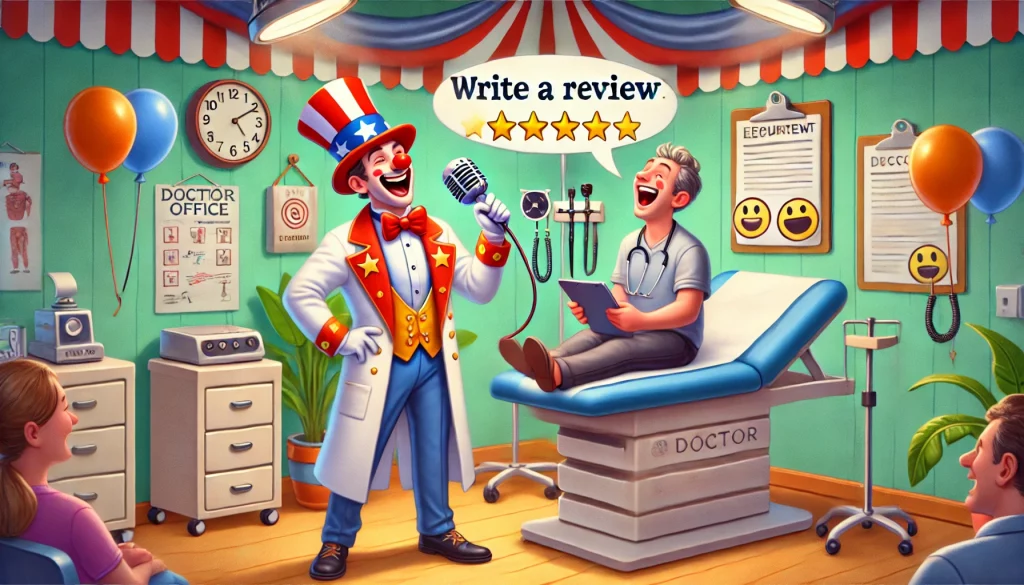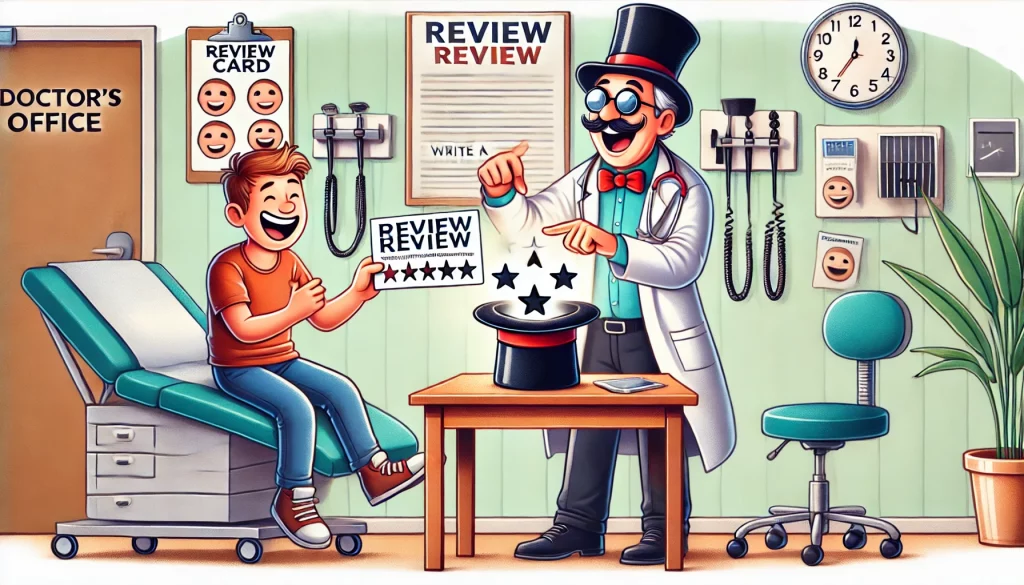How doctors get patients to write reviews: Boost your practice’s credibility and reach

In today’s digital age, online reviews have become an essential aspect of a healthcare provider’s reputation. Patients increasingly turn to online reviews to make decisions about their healthcare providers, and ignoring this trend is no longer an option.
This article outlines the importance of online reviews for healthcare providers, the benefits they bring, and practical strategies for obtaining and managing these reviews effectively.
Why online reviews matter for healthcare providers
Patient trust: Online reviews help build trust with potential patients. Positive feedback from other patients reassures new patients about the quality of care they will receive.
According to a survey by BrightLocal, 84% of people trust online reviews as much as personal recommendations.
Increased visibility: Reviews improve your practice’s visibility in search engine results. A higher number of positive reviews can help your practice rank higher, making it easier for patients to find you.
A study by Moz indicates that review signals account for about 15% of the total ranking factors for local SEO.
Reputation management: Managing online reviews allows you to shape your practice’s reputation. Responding to reviews, whether positive or negative, shows that you care about patient feedback and are committed to improving.
Research from ReviewTrackers shows that 53% of customers expect businesses to respond to negative reviews within a week.
Patient insights: Reviews provide valuable insights into patient experiences. This feedback can help identify areas for improvement and enhance the overall patient experience.
A study by Software Advice found that 77% of patients use online reviews as the first step in finding a new doctor.
Competitive edge: A strong online review profile can give you a competitive edge over other providers. Patients are more likely to choose a healthcare provider with numerous positive reviews over one with fewer reviews.
According to Healthgrades, 94% of patients use online reviews to evaluate healthcare providers.
Word-of-mouth amplification: Online reviews serve as a form of digital word-of-mouth. Satisfied patients sharing their positive experiences online can attract more patients to your practice.
A report by Pew Research Center found that 72% of internet users look online for health information.
Patient engagement: Engaging with reviews fosters a sense of community and patient loyalty. When patients see that their feedback is valued, they are more likely to stay loyal to your practice.
A survey by NRC Health found that 59% of patients say online reviews are important when choosing a healthcare provider.
Decision-making aid: Reviews aid patients in making informed decisions about their healthcare. Detailed patient experiences help potential patients understand what to expect from your practice.
A study by BrightLocal found that 91% of consumers read online reviews when searching for local businesses.

Challenges of getting reviews and solutions
Patient reluctance
Patients may feel uncomfortable or hesitant to leave reviews. To overcome this, ensure that the request process is simple and stress-free. Research by Podium shows that 70% of consumers will leave a review if asked.
Time constraints
Busy patients might not find the time to write a review. Offer multiple platforms for reviews, such as quick surveys via email or SMS, to make it more convenient. A study by Boast.io found that businesses see a 30% increase in review volume when using automated systems.
Privacy concerns
Patients may worry about their privacy when leaving reviews. Assure them that their personal information will remain confidential and focus on general feedback.
Negative feedback fear
Providers may fear receiving negative reviews. Embrace all feedback as an opportunity to improve and demonstrate your commitment to patient satisfaction by responding professionally. A Harvard Business Review study found that a one-star increase in Yelp rating leads to a 5-9% increase in revenue.
Lack of awareness
Some patients might not know that leaving a review is an option. Educate them about the importance of reviews and how it helps other patients make informed decisions.
Inconsistent requests
Not asking every patient for a review can lead to inconsistent feedback. Implement a systematic approach where staff routinely request reviews from every patient after their visit.
Technical difficulties
Patients may struggle with the technical aspects of leaving reviews. Provide clear instructions and assistance to guide them through the process.
Unhappy patients
Unhappy patients are more likely to leave reviews than satisfied ones. Balance this by proactively asking happy patients for reviews to ensure a more accurate representation of your practice.


How to get reviews from patients
Asking for reviews
If you’re good at what you do, you probably already receive regular compliments from your patients. Instead of keeping these kind words to yourself, use this as an opportunity to request a review.
Role of front desk staff
You can ask your patients to write reviews yourself, but it might be more comfortable to let your staff (or HIPAA-compliant online review software) handle these requests, rather than putting patients on the spot in the exam room. Have your front desk staff make friendly, polite conversation with every patient at the end of a visit. In order to get positive reviews, it’s important that they take just a little time to connect with each patient.
Effective communication
Tell staff to ask for verbal reviews by saying things like, “How was your visit today?” Note that they shouldn’t ask leading questions about any particular aspect of the visit which could be interpreted as prying or a privacy violation.
Appropriate timing
When a patient says that the experience was good, front desk staff should respond by saying something like, “That’s great! If you have a chance, we’d really appreciate it if you’d post a review on Yelp or Google – it helps spread the word and helps other patients find us.” Of course, staff should not ask patients who are unhappy, uncomfortable, or rushed to post an online review.
Rotating review sites
Rotate the review sites that your staff mentions to patients. Some people will search healthcare-related sites like Healthgrades, RealSelf, ZocDoc, etc., while others will gravitate towards more general review sites like Yelp, Facebook, and Google.
Using automated systems
Use an automated system to make sure you’re reaching all your satisfied patients and take the burden of asking for reviews off your staff. The system automatically contacts your patients via email or SMS text message with a one-question survey, then asks happy patients to write reviews and diverts unhappy patients back to you so you can address their concerns.
Benefits of online reviews
Enhanced SEO and online visibility: Having a steady stream of reviews improves your search engine optimization (SEO). This means your practice is more likely to appear at the top of search results, attracting more potential patients.
Increased patient trust: Positive reviews build trust with potential patients. Seeing that others have had good experiences can make new patients more comfortable choosing your practice.
Patient engagement and feedback: Online reviews provide valuable feedback from patients. This feedback can help you understand patient needs and improve your services.
Stronger online presence: An active presence on review sites enhances your online reputation. Regularly updated reviews keep your profile current and relevant.
Social media sharing: Satisfied patients often share their reviews on social media. This amplifies your reach and can attract even more patients through positive word-of-mouth.
Competitive advantage: More reviews can give you an edge over competitors. Patients are more likely to choose a provider with numerous positive reviews over one with few or no reviews.
Reputation management: Monitoring and responding to reviews allows you to manage your practice’s reputation proactively. Addressing concerns and thanking patients for positive feedback demonstrates your commitment to patient care.
Informed decision making: Reviews help potential patients make informed decisions about their healthcare. Detailed reviews about patient experiences can be a deciding factor for those considering your services.



Expert opinions on the importance of reviews in healthcare
Dr. Emily Parker, Medical Practice Consultant: “One of the most effective ways doctors can get patients to write reviews is by fostering a strong doctor-patient relationship. When patients feel genuinely cared for, they are more inclined to share their positive experiences. Providing personalized care and ensuring that each patient feels heard and valued can significantly boost the likelihood of receiving reviews.”
Dr. Jonathan Reed, Healthcare Marketing Specialist: “Integrating review requests into the patient follow-up process is crucial. After a patient’s visit, a timely and gentle reminder via email or SMS can be very effective. Automated systems that send these reminders can ensure consistency without adding extra work for the staff.”
Dr. Sarah Mitchell, Chief Medical Officer at HealthCare Plus: “Doctors should consider leveraging their online presence by encouraging patients to leave reviews on multiple platforms. While Google reviews are essential, platforms like Healthgrades and Yelp also play a significant role in a doctor’s online reputation. Diversifying where reviews are collected can enhance a practice’s visibility and credibility.”












